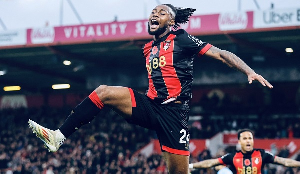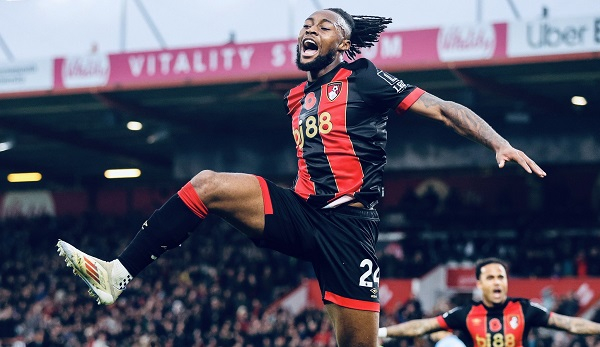Premier League managers: What do bosses do during games?
Faced by a four-minute delay as he awaited a decision, he appeared to play a game of rock, paper, scissors to highlight the unpredictable nature of a VAR call.
"VAR is interesting because in the past they put a heart-rate monitor on Brentford manager Thomas Frank and his heart rate went up from 60 beats per minute to 108 beats per minute when a VAR decision was being made," said Dr Cook.
"So what we saw Ange doing with rock, paper, scissors, I would suggest, could be because he was trying to distract himself - that's another way that we can regulate the emotions."

A variety of styles can be seen on the touchline in the Premier League
Tracksuit or suit - it's a debate as old as time.
So what did our data tell us? Predictably, very little. Five managers wore tracksuit bottoms, four of them failed to win. That's as good as it gets.
While a manager's attire may have nothing to do with what happens on the pitch, though, it does tell us a bit about them.
"We've all heard the expression power dressing," said Dr Cook. "If you're in a suit, particularly according to research with doctors, they're rated as having higher authority, higher power and higher credibility.
"Obviously, that's with doctors, not football managers. But research with sports psychologists has found that if they wear tracksuits then their sports-specific knowledge is deemed to be higher.
"So, as a manager, what do you value? Do you want people to see you as the authority figure looking different from everyone else? Or do you want to fit in in a tracksuit that will be the same as your background staff and be seen to have higher sport-specific knowledge?
"Which of those you value will then determine how you want to dress."
We've pored through the data, we've studied the heatmaps, we've done the sums. Lots of sums.
One thing is clear - every manager does it their own way and sometimes that way is successful and sometimes it isn't.
But when we asked both Dr Cook and Pearson - coming at this from different angles - what it actually all boils down to, they both used the same word: authenticity.
"A key construct in management is trust," said Dr Cook. "Do you trust your manager? If you trust what they suggest you should do, you're then more likely to work harder. The harder you work, the better you're likely to perform.
"And are they acting the same way in training when they're away from the performance arena? Or are they suddenly acting differently in a stadium? Because if there's a difference there, then it comes away as it's not as authentic.
"That can then reduce trust because one of the key factors that comes into trust is predictability and authenticity."
As Pearson, who has stood in the dugout as a manager for more than 600 games, concluded: "It's about being authentic and making sure that people have the information."












